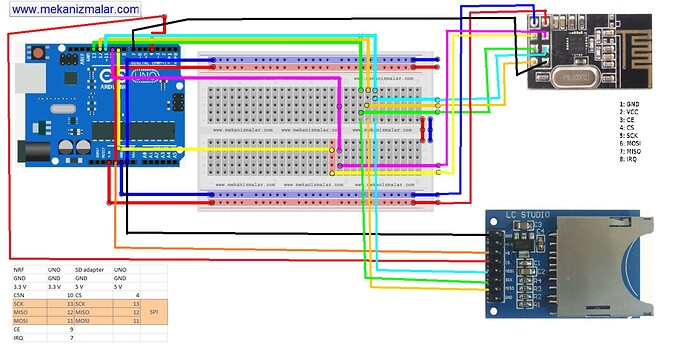Thank you for fast reply and advice.
I don't see any sketch with name u write in RF24 examples and can't find it in the internet. Can u send me this code if u know where is it?
I agree with you that conflict with CS1 and CS2 is probably the main problem of my project.
I try to always have CSN pin LOW and after transmision with SPI set it to HIGH. TX send "111" after every 3 seconds and it works without SD adapter.
Here's my RX code maybe it makes my project clearly
/*********************************************************************
** SPI-compatible **
** CS - to digital pin 9 (CE pin) **
** CSN - to digital pin 10 (SS pin) **
** MOSI - to digital pin 11 (MOSI pin) **
** MISO - to digital pin 12 (MISO pin) **
** CLK - to digital pin 13 (SCK pin) **
** CS2 SD - to digital pin 4 **
*********************************************************************/
#include <SD.h>
#include <SPI.h>
#include "API.h"
#include "nRF24L01.h"
File myFile;
//***************************************************
#define TX_ADR_WIDTH 5 // 5 unsigned chars TX(RX) address width
#define TX_PLOAD_WIDTH 32 // 32 unsigned chars TX payload
unsigned char TX_ADDRESS[TX_ADR_WIDTH] =
{
0x34,0x43,0x10,0x10,0x01
}; // Define a static TX address
unsigned char rx_buf[TX_PLOAD_WIDTH] = {0}; // initialize value
unsigned char tx_buf[TX_PLOAD_WIDTH] = {0};
//***************************************************
void setup()
{
Serial.begin(57600);
pinMode(CE, OUTPUT);
pinMode(CSN, OUTPUT);
pinMode(IRQ, INPUT);
SPI.begin();
delay(50);
init_io(); // Initialize IO port
unsigned char sstatus=SPI_Read(STATUS);
Serial.println("*******************RX_Mode Start****************************");
Serial.println("If no packet received, try to disconnect IRQ pin(10)");
Serial.print("status = ");
Serial.println(sstatus,HEX); // There is read the mode’s status register, the default value should be ‘E’
RX_Mode(); // set RX mode
SD_Init();
}
void loop()
{
for(;;)
{
unsigned char status = SPI_Read(STATUS); // read register STATUS's value
if(status&RX_DR) // if receive data ready (TX_DS) interrupt
{
SPI_Read_Buf(RD_RX_PLOAD, rx_buf, TX_PLOAD_WIDTH); // read playload to rx_buf
SPI_RW_Reg(FLUSH_RX,0); // clear RX_FIFO
for(int i=0; i<32; i++)
{
Serial.print(" ");
Serial.print(rx_buf[i]); // print rx_buf
}
Serial.println(" ");
SD_Write(1); // WRITE THING IN SD CARD
}
SPI_RW_Reg(WRITE_REG+STATUS,status); // clear RX_DR or TX_DS or MAX_RT interrupt flag
}
}
//**************************************************
// Function: init_io();
// Description:
// flash led one time,chip enable(ready to TX or RX Mode),
// Spi disable,Spi clock line init high
//**************************************************
void init_io(void)
{
digitalWrite(IRQ, 0);
digitalWrite(CE, 0); // chip enable
digitalWrite(CSN, 1); // Spi disable
}
/************************************************************************
** * Function: SPI_RW();
*
* Description:
* Writes one unsigned char to nRF24L01, and return the unsigned char read
* from nRF24L01 during write, according to SPI protocol
************************************************************************/
unsigned char SPI_RW(unsigned char Byte)
{
return SPI.transfer(Byte);
}
/**************************************************/
/**************************************************
* Function: SPI_RW_Reg();
*
* Description:
* Writes value 'value' to register 'reg'
/**************************************************/
unsigned char SPI_RW_Reg(unsigned char reg, unsigned char value)
{
unsigned char status;
digitalWrite(CSN, 0); // CSN low, init SPI transaction
SPI_RW(reg); // select register
SPI_RW(value); // ..and write value to it..
digitalWrite(CSN, 1); // CSN high again
return(status); // return nRF24L01 status unsigned char
}
/**************************************************/
/**************************************************
* Function: SPI_Read();
*
* Description:
* Read one unsigned char from nRF24L01 register, 'reg'
/**************************************************/
unsigned char SPI_Read(unsigned char reg)
{
unsigned char reg_val;
digitalWrite(CSN, 0); // CSN low, initialize SPI communication...
SPI_RW(reg); // Select register to read from..
reg_val = SPI_RW(0); // ..then read register value
digitalWrite(CSN, 1); // CSN high, terminate SPI communication
return(reg_val); // return register value
}
/**************************************************/
/**************************************************
* Function: SPI_Read_Buf();
*
* Description:
* Reads 'unsigned chars' #of unsigned chars from register 'reg'
* Typically used to read RX payload, Rx/Tx address
/**************************************************/
unsigned char SPI_Read_Buf(unsigned char reg, unsigned char *pBuf, unsigned char bytes)
{
unsigned char sstatus,i;
digitalWrite(CSN, 0); // Set CSN low, init SPI tranaction
sstatus = SPI_RW(reg); // Select register to write to and read status unsigned char
for(i=0;i<bytes;i++)
{
pBuf[i] = SPI_RW(0); // Perform SPI_RW to read unsigned char from nRF24L01
}
digitalWrite(CSN, 1); // Set CSN high again
return(sstatus); // return nRF24L01 status unsigned char
}
/**************************************************/
/**************************************************
* Function: SPI_Write_Buf();
*
* Description:
* Writes contents of buffer '*pBuf' to nRF24L01
* Typically used to write TX payload, Rx/Tx address
/**************************************************/
unsigned char SPI_Write_Buf(unsigned char reg, unsigned char *pBuf, unsigned char bytes)
{
unsigned char sstatus,i;
digitalWrite(CSN, 0); // Set CSN low, init SPI tranaction
sstatus = SPI_RW(reg); // Select register to write to and read status unsigned char
for(i=0;i<bytes; i++) // then write all unsigned char in buffer(*pBuf)
{
SPI_RW(*pBuf++);
}
digitalWrite(CSN, 1); // Set CSN high again
return(sstatus); // return nRF24L01 status unsigned char
}
/**************************************************/
void RX_Mode(void)
{
digitalWrite(CE, 0);
SPI_Write_Buf(WRITE_REG + RX_ADDR_P0, TX_ADDRESS, TX_ADR_WIDTH); // Use the same address on the RX device as the TX device
SPI_RW_Reg(WRITE_REG + EN_AA, 0x01); // Enable Auto.Ack:Pipe0
SPI_RW_Reg(WRITE_REG + EN_RXADDR, 0x01); // Enable Pipe0
SPI_RW_Reg(WRITE_REG + RF_CH, 40); // Select RF channel 40
SPI_RW_Reg(WRITE_REG + RX_PW_P0, TX_PLOAD_WIDTH); // Select same RX payload width as TX Payload width
SPI_RW_Reg(WRITE_REG + RF_SETUP, 0x07); // TX_PWR:0dBm, Datarate:2Mbps, LNA:HCURR
SPI_RW_Reg(WRITE_REG + CONFIG, 0x0f); // Set PWR_UP bit, enable CRC(2 unsigned chars) & Prim:RX. RX_DR enabled..
digitalWrite(CE, 1); // Set CE pin high to enable RX device
// This device is now ready to receive one packet of 16 unsigned chars payload from a TX device sending to address
// '3443101001', with auto acknowledgment, retransmit count of 10, RF channel 40 and datarate = 2Mbps.
}
///////////////////// SD INIT
void SD_Init(void)
{
//SD code
Serial.print("Initializing SD card...");
if (!SD.begin(4)) {
Serial.println("initialization failed!");
return;
}
Serial.println("initialization done.");
}
////////////// SAVE ON SD CARD
void SD_Write(int z)
{
myFile = SD.open("example.txt", FILE_WRITE);
if (myFile)
{
myFile.print("value : ");
myFile.println(z);
}
else
{
Serial.println("blad otwarcia pliku");
}
}

